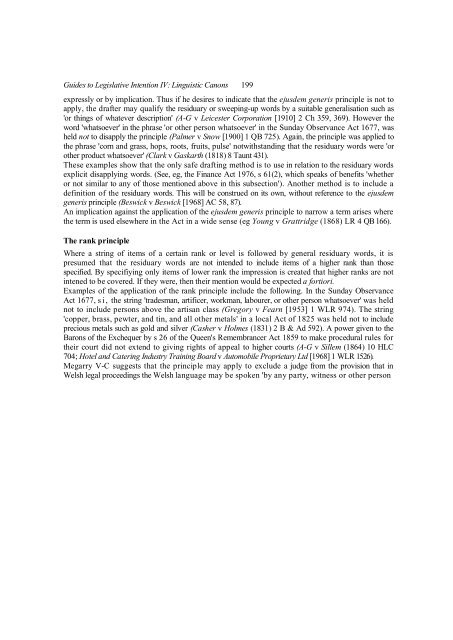Statutory Interpretation The Technique of Statutory ... - Francis Bennion
Statutory Interpretation The Technique of Statutory ... - Francis Bennion
Statutory Interpretation The Technique of Statutory ... - Francis Bennion
You also want an ePaper? Increase the reach of your titles
YUMPU automatically turns print PDFs into web optimized ePapers that Google loves.
Guides to Legislative Intention IV: Linguistic Canons 199<br />
expressly or by implication. Thus if he desires to indicate that the ejusdem generis principle is not to<br />
apply, the drafter may qualify the residuary or sweeping-up words by a suitable generalisation such as<br />
'or things <strong>of</strong> whatever description' (A-G v Leicester Corporation [1910] 2 Ch 359, 369). However the<br />
word 'whatsoever' in the phrase 'or other person whatsoever' in the Sunday Observance Act 1677, was<br />
held not to disapply the principle (Palmer v Snow [1900] 1 QB 725). Again, the principle was applied to<br />
the phrase 'corn and grass, hops, roots, fruits, pulse' notwithstanding that the residuary words were 'or<br />
other product whatsoever' (Clark v Gaskarth (1818) 8 Taunt 431).<br />
<strong>The</strong>se examples show that the only safe drafting method is to use in relation to the residuary words<br />
explicit disapplying words. (See, eg, the Finance Act 1976, s 61(2), which speaks <strong>of</strong> benefits 'whether<br />
or not similar to any <strong>of</strong> those mentioned above in this subsection'). Another method is to include a<br />
definition <strong>of</strong> the residuary words. This will be construed on its own, without reference to the ejusdem<br />
generis principle (Beswick v Beswick [1968] AC 58, 87).<br />
An implication against the application <strong>of</strong> the ejusdem generis principle to narrow a term arises where<br />
the term is used elsewhere in the Act in a wide sense (eg Young v Grattridge (1868) LR 4 QB 166).<br />
<strong>The</strong> rank principle<br />
Where a string <strong>of</strong> items <strong>of</strong> a certain rank or level is followed by general residuary words, it is<br />
presumed that the residuary words are not intended to include items <strong>of</strong> a higher rank than those<br />
specified. By specifiying only items <strong>of</strong> lower rank the impression is created that higher ranks are not<br />
intened to be covered. If they were, then their mention would be expected a fortiori.<br />
Examples <strong>of</strong> the application <strong>of</strong> the rank principle include the following. In the Sunday Observance<br />
Act 1677, si, the string 'tradesman, artificer, workman, labourer, or other person whatsoever' was held<br />
not to include persons above the artisan class (Gregory v Fearn [1953] 1 WLR 974). <strong>The</strong> string<br />
'copper, brass, pewter, and tin, and all other metals' in a local Act <strong>of</strong> 1825 was held not to include<br />
precious metals such as gold and silver (Casher v Holmes (1831) 2 B & Ad 592). A power given to the<br />
Barons <strong>of</strong> the Exchequer by s 26 <strong>of</strong> the Queen's Remembrancer Act 1859 to make procedural rules for<br />
their court did not extend to giving rights <strong>of</strong> appeal to higher courts (A-G v Sillem (1864) 10 HLC<br />
704; Hotel and Catering Industry Training Board v Automobile Proprietary Ltd [1968] 1 WLR 1526).<br />
Megarry V-C suggests that the principle may apply to exclude a judge from the provision that in<br />
Welsh legal proceedings the Welsh language may be spoken 'by any party, witness or other person

















